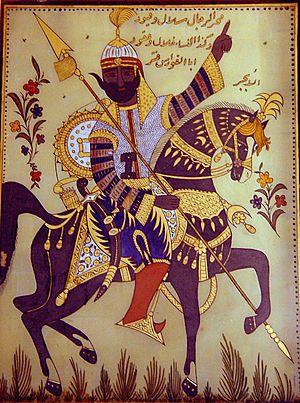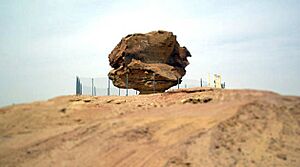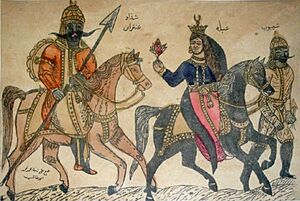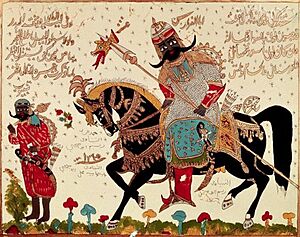Antarah ibn Shaddad facts for kids
Quick facts for kids
Antarah ibn Shaddad
عنترة بن شداد |
|
|---|---|
 |
|
| Born | 525 AD |
| Died | 608 AD (aged 83) Ha'il, Ancient Arabia, (present-day Saudi Arabia)
|
| Era | Pre-Islamic Arabia |
| Region | Al Jiwa, Ancient Arabia, Arab world |
|
Main interests
|
Arabic poetry |
|
Influenced
|
|
Antarah ibn Shaddad al-Absi (Arabic: عنترة بن شداد العبسي, ʿAntarah ibn Shaddād al-ʿAbsī), also known as ʿAntar, was a famous Arab knight and poet who lived a long time ago, between 525 AD and 608 AD. He was known for his amazing poems and his exciting life full of adventures.
One of his most important poems is part of the Mu'allaqat. This is a special collection of seven "hanging odes" that were supposedly hung in the Kaaba, a very important building in Mecca. The stories about Antarah's life have also inspired a long and exciting tale.
Antarah's Life Story

Antarah was born in Najd, a region in Arabia. His father, Shaddād al-ʿAbsī, was a respected warrior from the Banu Abs tribe. His mother, Zabeebah, was an Ethiopian woman who had been taken captive. Because of his mother's background, Antarah grew up without freedom.
He was described as having a dark complexion. Antarah fell in love with his cousin, ʿAblah. However, because of his social standing, he couldn't hope to marry her. He also faced difficulties from his father's wife, Shammeah.
Antarah soon became known and respected for his incredible bravery and skills. He was a talented poet and a very strong warrior. He earned his freedom during a time when another tribe attacked the lands of the Banu ʿAbs.
When his father asked him to fight, Antarah first said that someone without freedom wasn't good for fighting, only for simple tasks. But his father then told him, "Defend your tribe, O ʿAntar, and you are free!" After Antarah bravely helped defeat the attackers, he finally gained his freedom.
He then wanted to marry his cousin, ʿAblah. To get permission, Antarah had to complete difficult tasks. One challenge was to get a special type of camel from a northern Arab kingdom called the Lakhmids. Antarah also took part in a big war between the ʿAbs and Dhubyān tribes. This war started because of a horse race and was called the War of Dāhis and Ghabrā.
There are different stories about how and when Antarah died. Some say he was killed in battle, while others believe he died peacefully when he was old.
Antarah's poems are still well-known today. They often talk about being brave, honorable, and heroic in battle. They also express his deep love for ʿAbla. His poetry became famous when one of his poems was chosen for the Mu'allaqat. This collection of poems was said to have been hung in the Kaaba. His poems are important because they give us detailed descriptions of battles, armor, weapons, horses, and desert life from his time.
Antarah's Lasting Impact
The exciting story of ʿAntar and ʿAbla became a long poetic tale. It is often told by storytellers in Arab coffee houses even today. Its importance is sometimes compared to the famous English stories of King Arthur and his knights. Antarah's home and his horse stable were also very famous in legends.
The Russian composer Nikolai Rimsky-Korsakov created his Symphony No. 2 based on the legend of ʿAntar. In 1898, a French painter named Étienne Dinet translated an old Arab poem about Antar. This helped people in Europe learn about Antar bin Shaddad. Many other works, like Diana Richmond's Antar and Abla, have also helped spread these legends in the West. "Antar" is also the name of the first Palestinian opera, created by Mustapha al-Kurd in 1988.
The Lebanese painter Rafic Charaf started painting a series of artworks in the 1960s that showed scenes from the adventures of Antar and Abla. These paintings show his interest in the popular stories of the region and are considered very important in his work.
Antarah's Writings
Antarah's poems can be found in collections like The Divans of the six ancient Arabic poets. They have also been published on their own. The long story called The Romance of 'Antar (Sīrat 'Antar ibn Shaddād) was first passed down by people telling it aloud. It grew to be very long and has been published in many volumes. Parts of it were translated into English as Antar, a Bedoueen Romance. This story was also translated into Turkish in 1477 AD for Sultan Mehmed the Conqueror.
See also
 In Spanish: Antarah ibn Shaddad para niños
In Spanish: Antarah ibn Shaddad para niños
 | Delilah Pierce |
 | Gordon Parks |
 | Augusta Savage |
 | Charles Ethan Porter |



